Happy Farmers Change the World
Mick McEvoy
Ten years of organic, regenerative farming in Plum Village
In 2012, three lay practitioners and three Plum Village monastics joined forces to set out to realize our collective dream to grow fresh organic fruit and vegetables to feed the Plum Village community. Over the course of 2013, they made the first steps–laying the groundwork for the development of a small organic vegetable farm at West Lake, just down the hill from Upper Hamlet. The Happy Farm project is the concrete expression of Thay’s vision of meditation engaged with action in the area of sustainable and ethical food production.
The project now has three plots. The original farm in Upper Hamlet/Son Ha, one in Lower Hamlet, and one in New Hamlet.
The Happy Farmers hope to demonstrate that productivity, environmental sustainability and personal happiness do not have to be in conflict, but are three essential pillars that can strengthen each other.
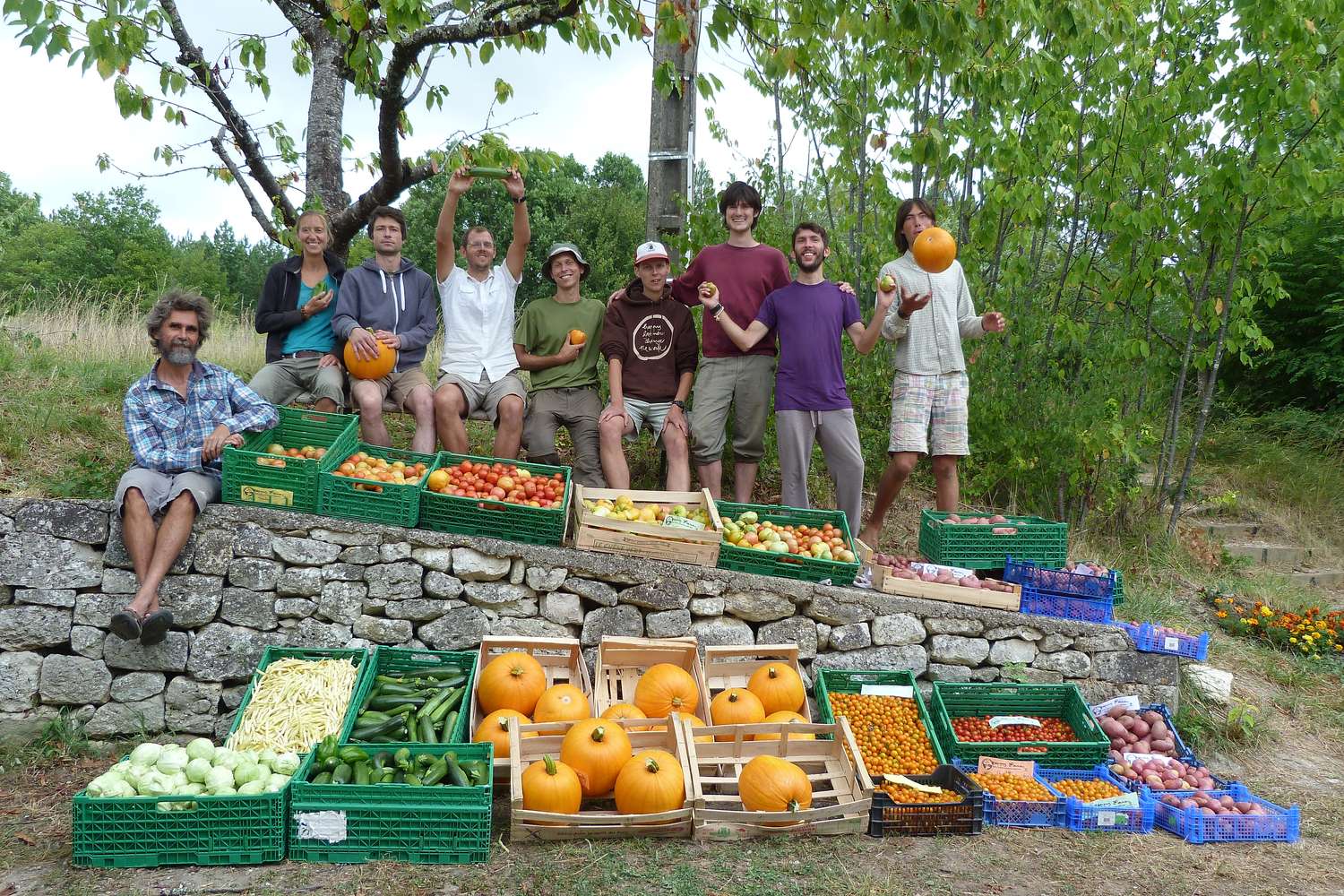
The aims of the Happy Farm
To grow healthy organic vegetables for the Plum Village community
The Happy Farm method is an intensive method, growing a lot of vegetables on a small scale, combining classical organic farming methods with permaculture elements.
The main aim is to nourish the soil and to grow vegetables organically by using natural soil amendments, organic fertilizer and natural pesticides, crop rotation, green manure, cultivating the soil in ways that preserve the delicate soil ecosystem, mulching, companion planting and more. We also try to take care of the surrounding habitat, and to provide good conditions for pollinating insects to flourish.
A variety of vegetables are grown in each hamlet. They are especially cultivated to supplement the food bought for the Spring and the Summer Retreat. The Summer Retreat in July is usually (depending on conditions) attended by more than 1,000 people per week.
We know that modern agriculture, which feeds the world, unfortunately is an industrial system. There are many extra elements that are really unnecessary and not so good for our health or for Mother Earth. We are very concerned with the concept and application of interbeing as Thich Nhat Hanh teaches. We care for the ‘more than human being’ life that is here on the land. The soil is very alive, we try to have respect and reverence for the soil, as well as respect and reverence for the humans that are eating the food that we produce. That’s why we even go beyond organic.
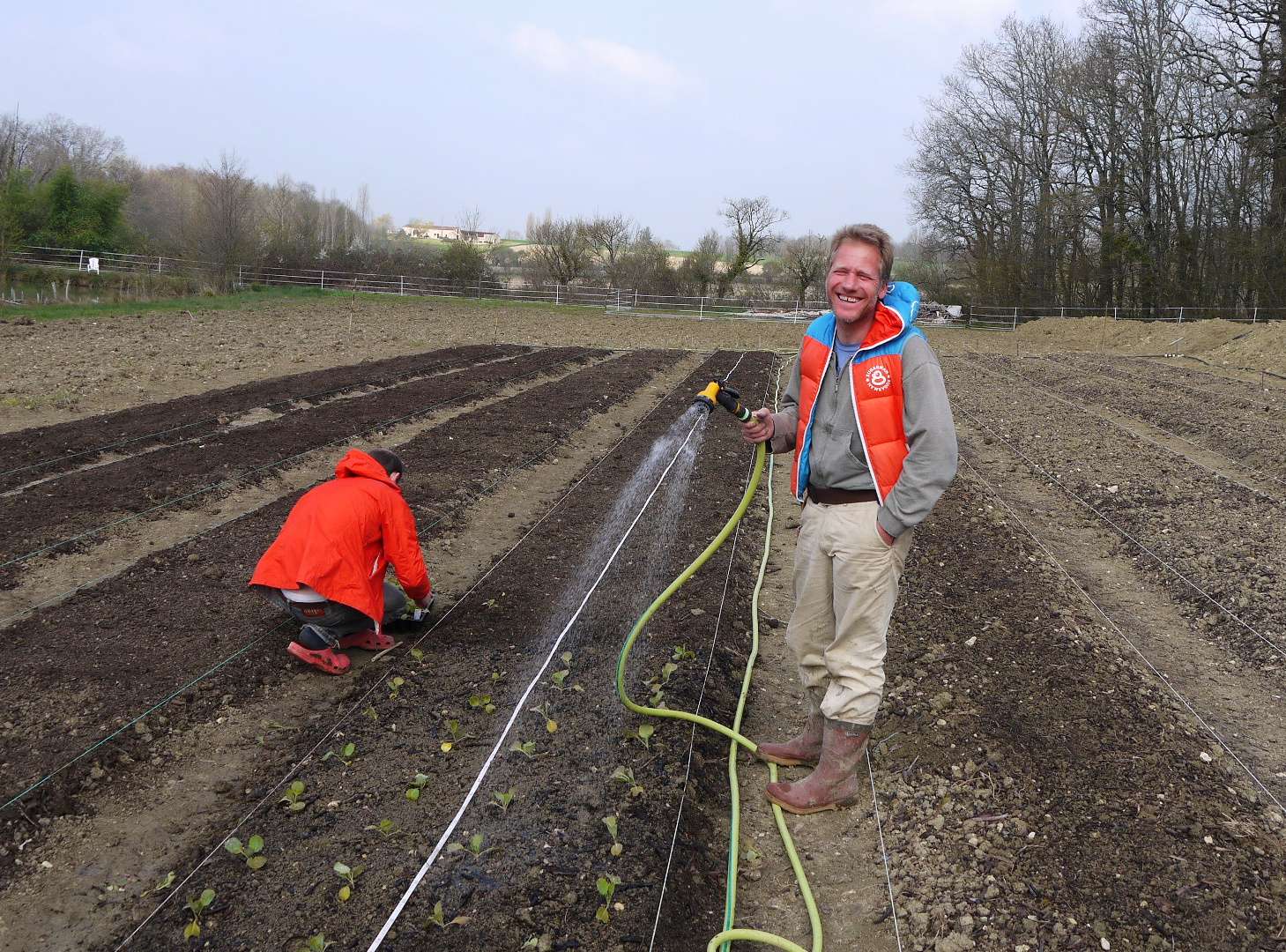
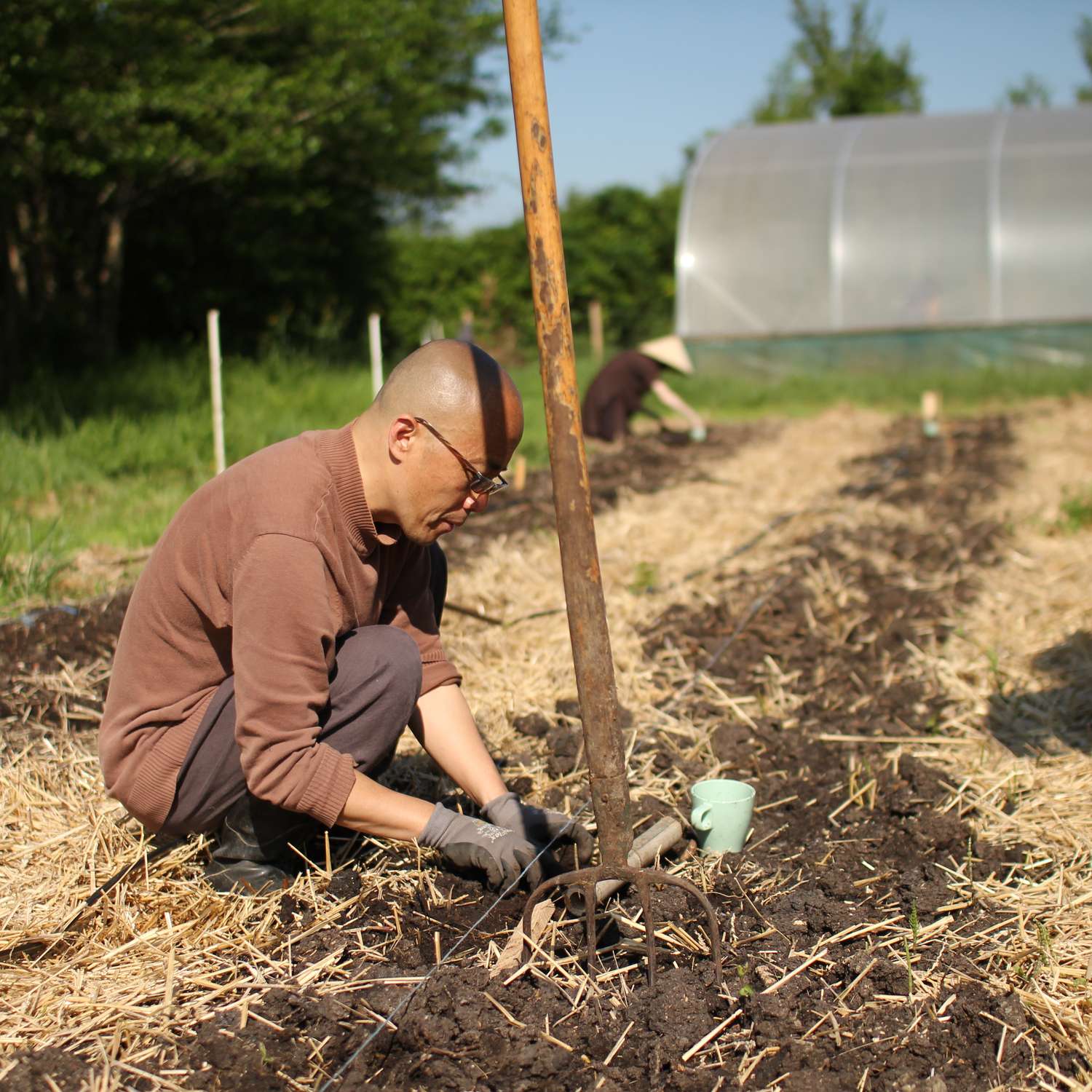
To train people in applying the principles of mindfulness in a working environment
Spiritual cultivation and mindfulness training are essential aspects of the Happy Farm. It is a training ground for applying the principles of mindfulness in a working environment.
The farmers practice to farm as a family, a spiritual community, taking care of each other’s wellbeing and spiritual growth. We begin each work day with a short sitting meditation, followed by a check-in where each person shares how they are at the moment. We can share our joys and offer support to anyone going through something difficult. We also enjoy working in silence for certain periods, using the breath to anchor ourselves in the present moment, stopping to listen to the bell throughout the day, and having regular team sharings. Sharing responsibilities, we also learn from each other and enjoy many joyful moments. The farmers from the different farms benefit from each other’s experience, meet for work exchanges and spend time together.
We observe the Five Mindfulness Trainings and the Six Harmonies while striving to find a balance between practicing deeply and getting the work done.
We have a core team who live as a Happy Farm family within the monastery as well as being part of the wider community. Also, at different times of the year we welcome shorter-term volunteers. It’s a skill and a challenge to live in community because there are many joys, but also many challenges. We talk so much about harmony and community in Plum Village. It’s a messy but beautiful journey of working and living together.
Happy farmers are not fundamentalists in happiness: all emotions are welcome, all human experience is welcome in our inner landscapes. It’s about bringing that onto the land, into the working environment, with the stresses and pressures that we all experience, into the team dynamic, the family dynamic and learning to communicate and to listen to another’s needs. This is the idea of mindful living in day-to-day life.
Education in growing organic food, sustainability, and mindfulness practice
The project exists also to inspire and to educate people in a pedagogical way, with learning by doing rather than a more theoretical or classroom-based form of learning. People who come to the farm for the one year program go through the whole cycle of seasons from seed to plate and beyond. They go away after the year with the skills to start growing some of their own food or set up their own projects, which many people have done in different parts of the world.
The Happy Farms
Upper Hamlet
In 2013 the first Happy Farm was founded in Upper Hamlet. It was the realization of a long-held wish to produce local, seasonal, organic vegetables within Plum Village and to go in the direction of sustainability and food security for the Plum Village community.
There is around one acre of land in cultivation comprising more than forty beds, 35 metres long and 1.2 meters wide, and a large polytunnel greenhouse with 6 beds, each 27 meters long. These are used for the main annual crops, and in addition, there are other plots for perennials: herbs, berries, and asparagus. Each year we also plant some fruit and nut trees with the aim of eventually having a food forest.
The farm continues to grow and flourish in beautiful and unexpected ways. Since the farm began, we produce an average of around 8,000 kilograms of organic produce each year, worth approximately €30,000.
Every year the Upper Hamlet farm hosts about 500 children during the Summer Family Retreat. During Plum Village’s annual Wake Up Earth Retreat, about 500 young adults get to get their hands mindfully dirty on the farm. We started to offer Happy Farm Experience Weeks in 2018.
Lower Hamlet
In 2016, the Happy Farm in Lower Hamlet was started with fourteen beds and a small herb garden. This was expanded in 2017. In the first year, more than 1,000 kilograms of vegetables were harvested. The food grown is offered to the Lower Hamlet sangha. They have hosted several Happy Experience Weeks for lay women and couples who have come from all over the world to participate. They have also offered many children and retreatants a chance to be close to nature and discover the wonder of growing your own food with love.
In 2021, the Lower Hamlet Happy Farm was moved to new land (about 50 meters away) and great care was taken to move the rich soil that had been carefully cultivated from the previous years, to the new location.
New Hamlet
The New Hamlet Happy Farm manifested the most recently. Although it officially began in the spring of 2017, gardening and farming in New Hamlet was started many years before by Sr. Bao Nghiem who had a green thumb and planted many different kinds of vegetables in the greenhouses and outdoors. We also had a horticultural garden before it became part of the Happy Farm. The first sister in charge of the Happy Farm was Sr. Nguyet Nghiem who received a lot of support from the Happy Farm brothers in Upper Hamlet. Slowly, three long-term friends joined the team and one of them is now in training to become a nun and continues to support the Happy Farm.
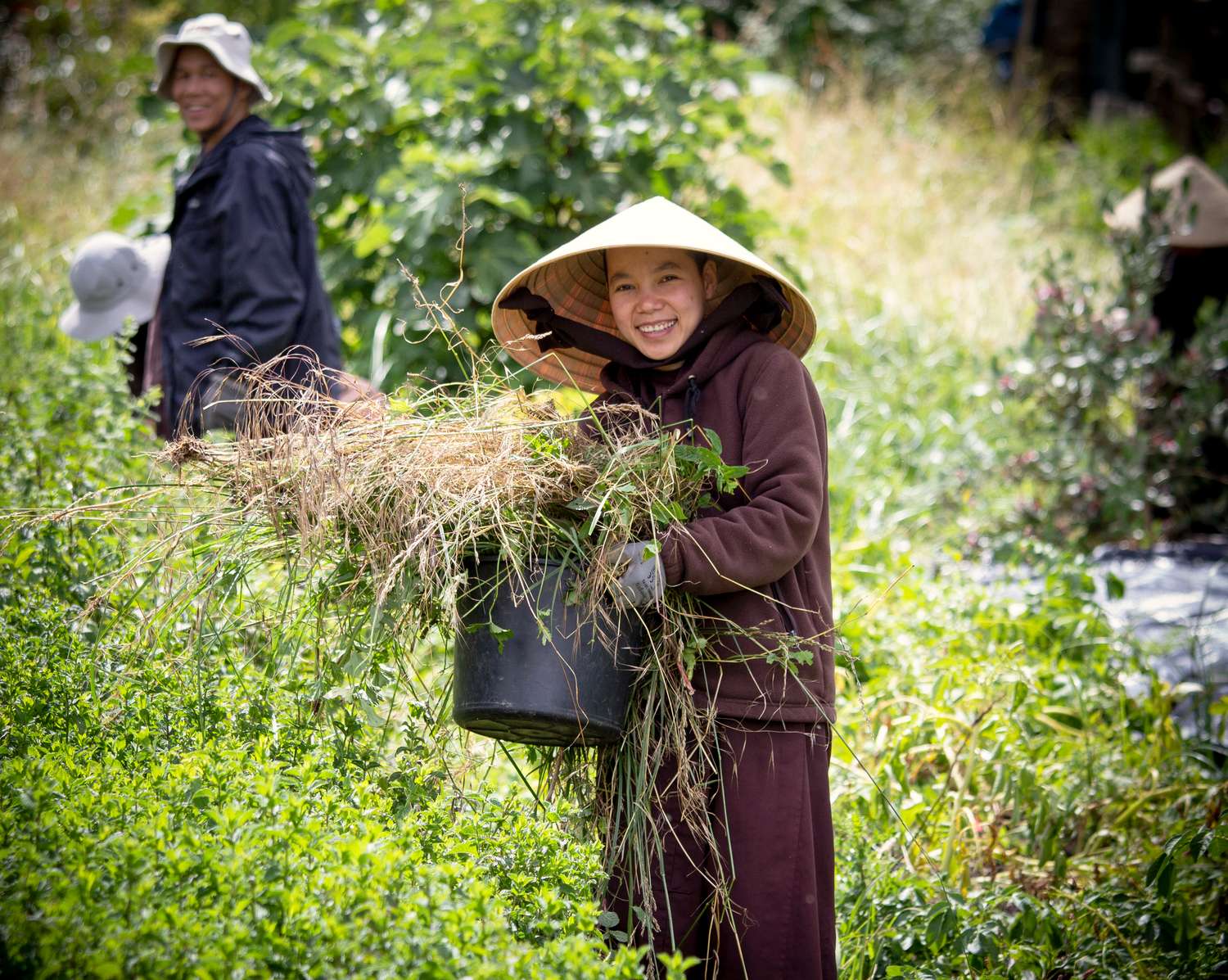
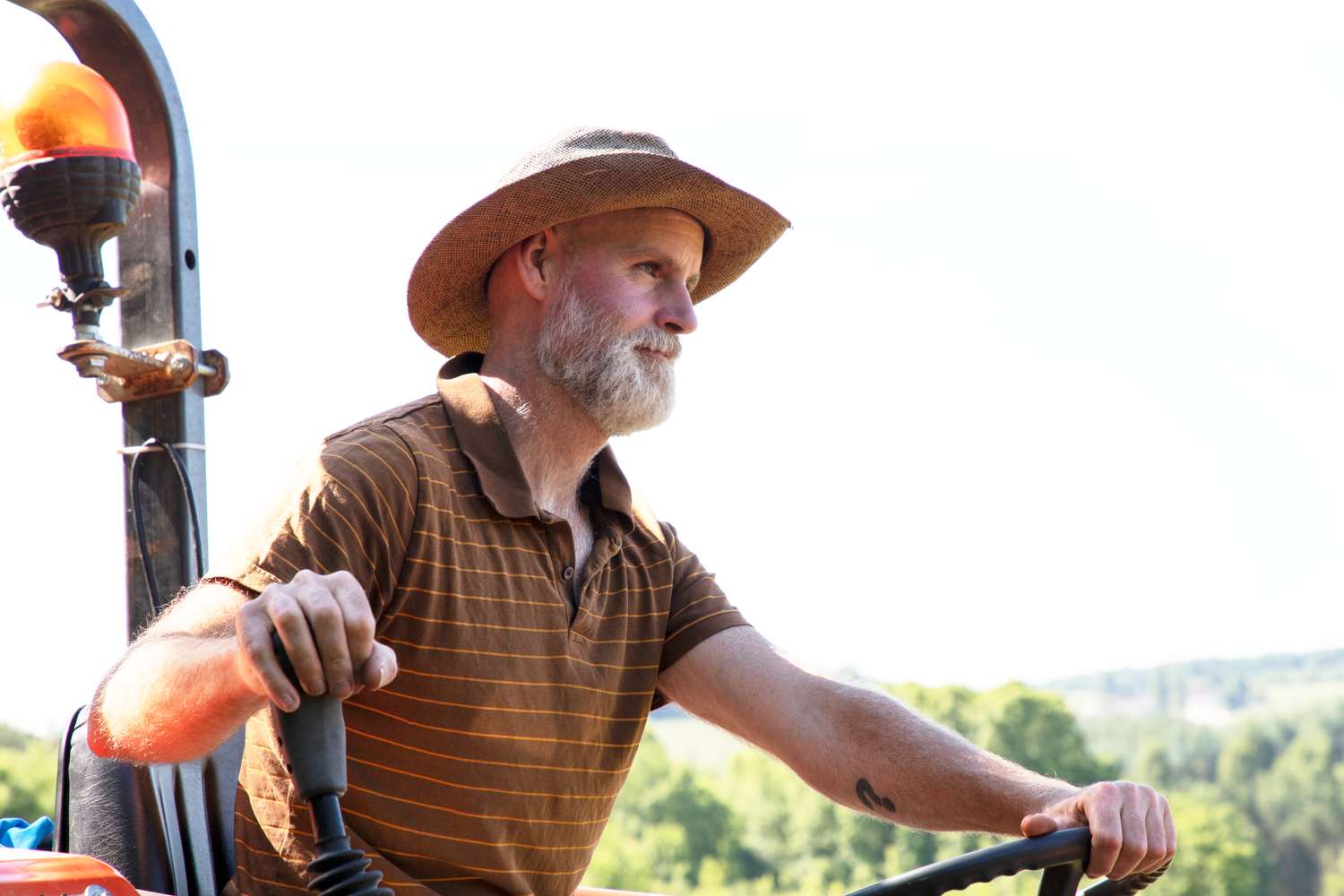
Looking forwards
During the pandemic, we haven’t been able to host guests and that has given myself and the community around the Happy Farm the opportunity to step back and really reflect on what is its real meaning and purpose. We have moved away from getting caught up with wanting to cultivate just a little bit more, to offer just a little bit more food. We have come to realize that it’s not about the carrots, but about collective awakening. It’s coming back to the spirit of our mindfulness practice, our spiritual practice, our practice as a family, siblinghood, manifesting joy, manifesting harmony and having fun—bringing the element of play into the farm.
More and more now it becomes clear as the farm matures, that we are in such a beautiful setting; we have mature oak forest on one side with a beautiful wetland on the other. We are very fortunate. We also have a very species-rich grassland and a wildflower grassland. The existing ecology and the ‘more than human beings’ that we share the land with, are showing themselves every year as the site develops and maybe actually has healed a little from when we first made an intervention onto the land as farmers.
The community in Upper Hamlet has acquired more land, which is old agricultural land adjacent to the farm with pockets of mature, native forest. Together with the monastic community and residential community, we have a plan for what we call “rewilding” some of that land. The fields that were cultivated every year, that were tilled, that gave copious amounts of wheat, sunflowers, and other crops are now just healing. The soil is healing. It’s closing over and going from wildflower meadows in the first few years to the first few oaks and elms. Field maples, wild roses, blackberries, they’re all re-manifesting in these fields.
Most of the rewilding will be done through natural regeneration, relying on the earth’s capacity to heal herself. This forest will actually come from the existing pockets of woodland and seed itself. It has already begun to happen. The wild animals, the ‘more than humans’ that share the land, like the numerous wild boar, are like ecological engineers for us, they use their tusks and their nose to break open the soil leaving bare patches of soil where the seeds of many of these pioneer tree species are rooting in. We’re helping nature, for example, by excluding the deer that graze off some of this regeneration, but we’re doing it in partnership and letting Mother Nature take the lead. Our role as human beings is to get out of Mother Nature’s way and help only when needed.
When Plum Village reopens, opportunities will manifest for ecological retreats where we can bring our mindfulness practice onto these lands. Guests will be able to plant more native trees to restore the ecosystem and be a part of that healing.
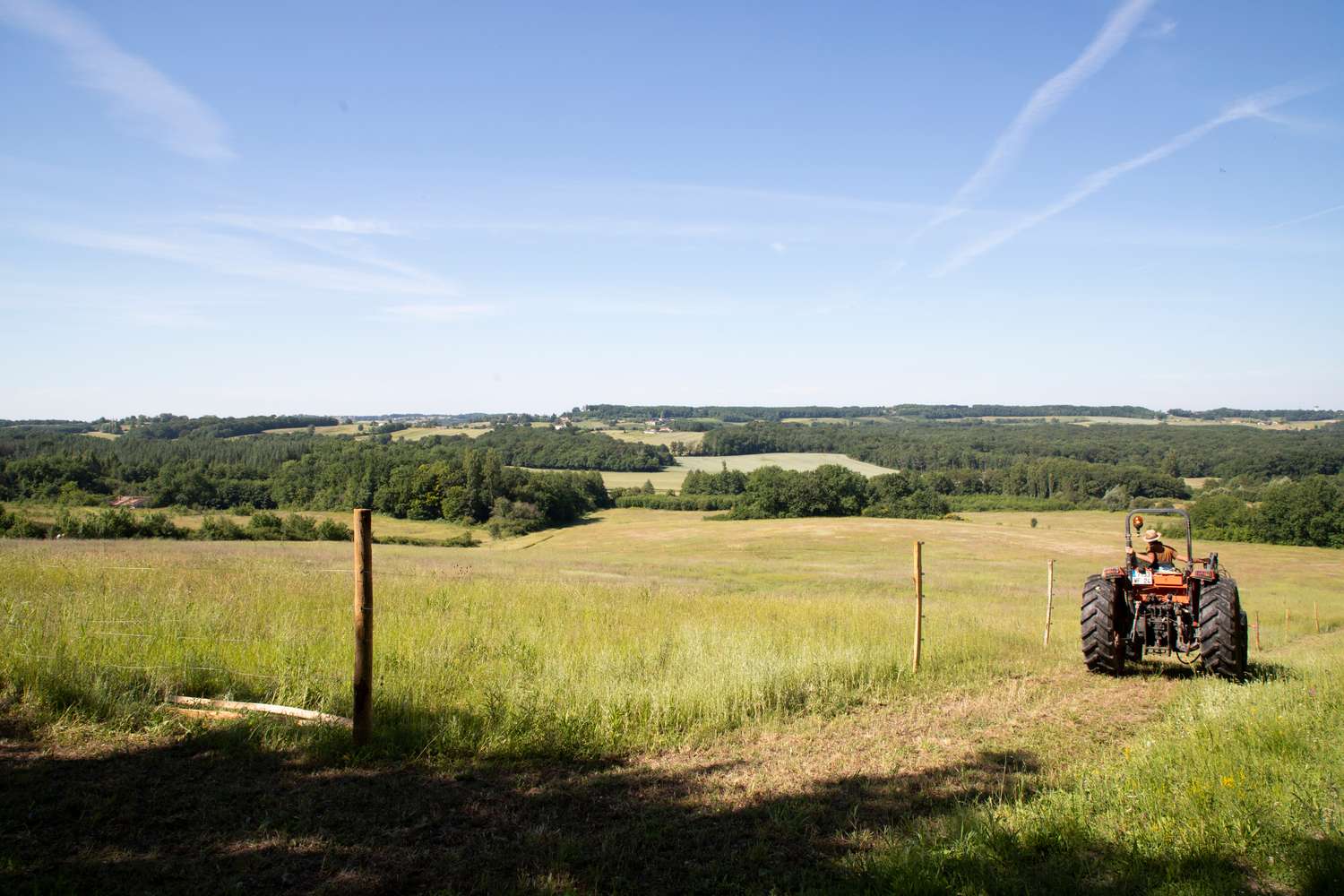
Further down the road we have the potential to develop a portion of land for what we call agroforestry. That’s an old style of forestry that exists in places like Spain traditionally, with cereal crops growing in avenues between trees like walnuts, hazelnuts, apricots, or apples and many more combinations. So the two coexist. We will probably partner with the farmers in the region. Again, it’s all in the spirit of organic cultivation. We could even grow soya for our homemade tofu and wheat, spelt, or rye for our own bread baked in wood-fired ovens! We want to complete the circle a little more and produce more here for our community, in our community. This long-term project will be done in the spirit of bringing greater reverence for beings that we share the land with, to bring this spirit further into our collective consciousness on the farm and in the community.